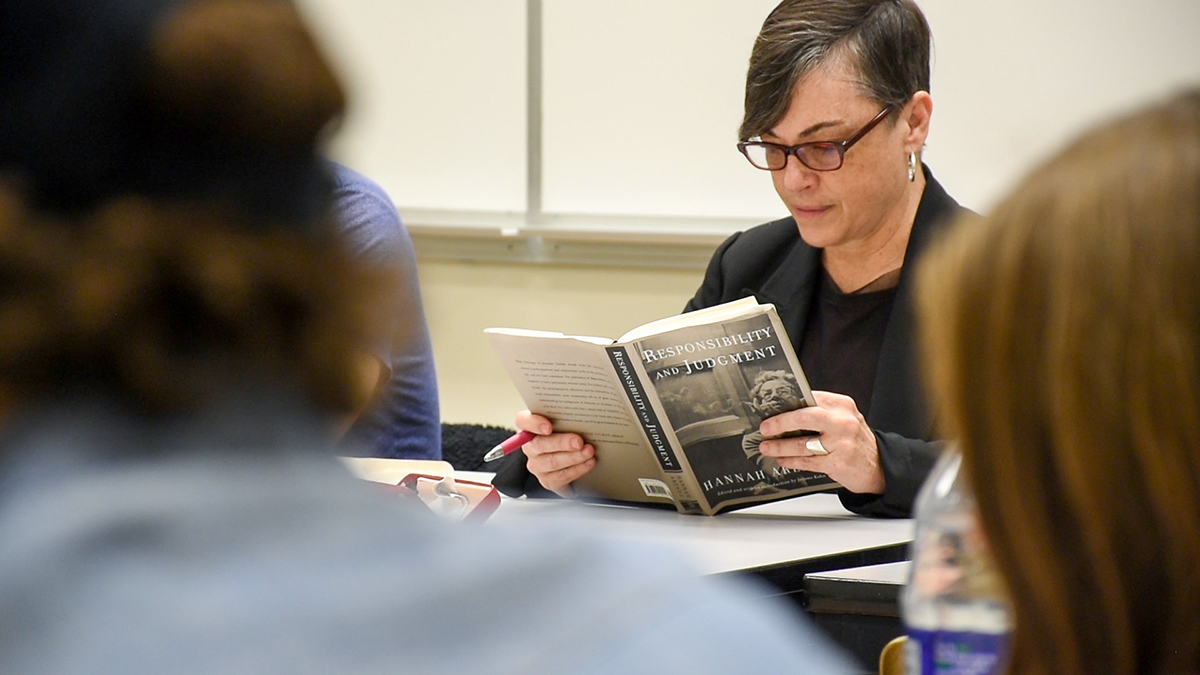Facilitating Discussions with Dr. Catherine Kellogg
In her political theory seminar discussions, Dr. Kellogg engages the performative and improvisational elements of teaching to draw her students out. In so doing she helps students to access their existing knowledge and facilitates their learning by helping student to build on that prior knowledge.
My Teaching Practice - Teaching students to read, write, and speak better
"The more that I try to stay focused on education as a kind of drawing out, […] the more I have learned to relax, because there's a whole lot less to do than I ever thought when I started [teaching] twenty years ago."
-Catherine Kellogg
What Inspires You In Your Teaching?
I am enormously intrigued by the puzzle that is teaching and learning. In fact, one of the things I love best about undergraduate teaching is that it persistently puts me in the middle of that puzzle. Like all puzzles, both teaching and learning require patience, the ability to sit with frustration, the ability to discern patterns after that patient work, and the ability to come up with a method for doing all of those things.
The teachers I have most admired introduced me to ways of developing those capacities, and they had some important attributes in common. They were electrifying in the classroom; they were willing to show me how to read great writing; they taught me how to reflect on my thinking and how to sharpen my writing; and they were unafraid of questions too difficult to answer quickly. In short, they were charismatic, positive, engaging, respectful, patient and fearless. Because of them, I view myself primarily as a facilitator of learning, rather than as an expert who 'delivers' information to students. Indeed, they all helped me develop what I consider my greatest strength as a teacher: finding the balance between a clear curriculum on the one hand, and spontaneity and the capacity to improvise on the other.

"If you do less, they'll do more."
-Catherine Kellogg
About Dr. Catherine Kellogg
Catherine Kellogg is a Professor of Political Science at the University of Alberta. She specializes in political theory, and is the author of Law's Trace: From Hegel to Derrida (Routledge 2010). She has also published numerous articles and book chapters on Arendt, Hegel, Derrida, Malabou, Benjamin, Nancy, and Agamben. Her work has appeared in such journals as Law, Culture and the Humanities, Philosophy & Social Criticism, Law and Critique, Cultural Values, and Theory and Event. She is currently working on a project that investigates cruel punishment.
Awards
Rutherford Award for Excellence in Undergraduate Teaching 2017 McCalla Professorship 2015 Faculty of Arts Undergraduate Teaching Award 2015
Want To Learn More About Designing Engaging Discussions?
Dallimore, E. J., Hertenstein, J. H. & Platt, M. B. (2004). Classroom participation and discussion effectiveness: student-generated strategies. Communication Education, 53(1), 103-115. DOI: 10.1080/0363452032000135805
Hess, D. E. (2009). Controversy in the classroom: The democratic power of discussion. New York: Routledge.
Rocca, K. R. (2010). Student Participation in the College Classroom: An Extended Multidisciplinary Literature Review, Communication Education, 59(2), 185-213, DOI: 10.1080/03634520903505936
CTL Workshop: Active Learning (PPT slides)